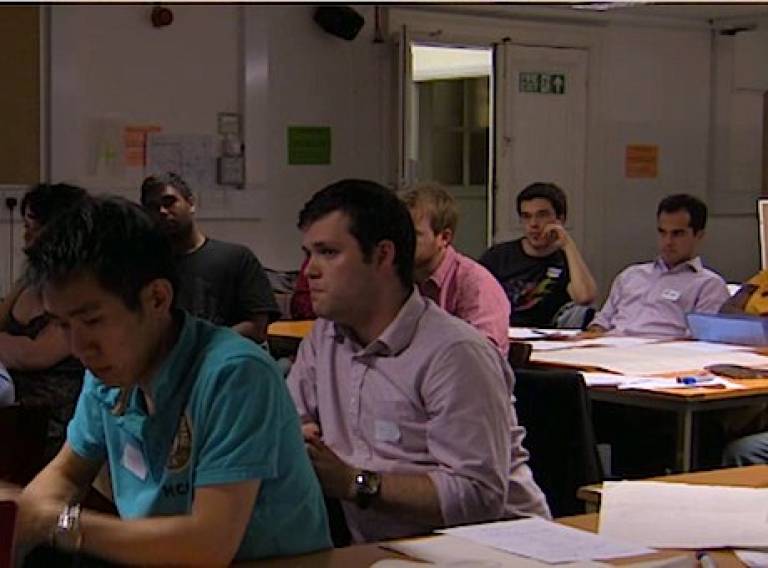Post-Disaster Interdisciplinary Scenario Seminar (UPDATE)
8 December 2011

On Monday, 14 June 2010 a multi-disciplinary group of approximately 40 students from the Development Planning Unit, the MSc in Earthquake Engineering with Disaster Management and the Bartlett School of Planning took part in a Post-disaster Scenario Seminar.
The seminar, funded by the Executive Sub-Committee on Innovations in Learning, Teaching and Assessment (ESCILTA), a University College London (UCL) Academic Committee grant, was an interdisciplinary one in which students in mixed teams were challenged to develop a recovery plan for the 2005 Kashmir Earthquake (Pakistan) based on data sourced 2 months after the event.
Organized by Dr Camillo Boano (DPU), Dr Tiziana Rossetto and Dr John Twigg (CEGE), the seminar was part of a collaborative inter-departmental effort uniting common interests in Disasters, Recovery, Vulnerabilities and Resilience. Benjamin Leclair-Paquet (DPU Alumnus and resident in Decolonizing Architecture) and Helen Bottomley (Student in Earth Sciences) assisted staff in the preparation and facilitation of the seminar.Ms. Maggie Stephenson, Mr. Habib Mughal and Mr. Sheik Ashan Ahmed, all of UN-Habitat Pakistan, helped the organizers to prepare and develop the scenario presented to the participants. Providing background information and literature, they helped formulate the goal of the exercise during the preparatory stage. On the day of the seminar, UN staff and Maira Zahur (NGO activist) attended remotely via skype connection, interacting with participants in the different phases by providing input, answering questions and commenting on the recovery plans developed by the students.
During the development of the scenario, participants were given valuable input from various experts in order to strengthen their preparation in the sequential steps of the exercise. Invaluable contributions were made by Victoria Batchelor (Arup International Development) and Babar Mumtaz (Independent Consultant), who also provided additional input with closing feedback and reflective comments.The scenario logically articulated the chain of consequences resulting from the earthquake within the specific setting of Pakistan. It was designed to provoke a careful examination of all the assumptions on which interventions are based, including the impact on long-term actions, the potential disruption of resettlement, the vulnerabilities of the built environment and rural-urban nexus. Such complexity was useful both for testing students' abilities to respond effectively to practical problems and also as a reflective tool to elaborate conceptual insights on disaster theories and debates.
The exercise strengthened collaborative relationships with the aforementioned departments in UCL and provided students with a unique learning experience that will hone skills of communication, teamwork, and holistic thinking on disaster and disaster recovery, complementing the curricular in-class training experience.
 Close
Close

